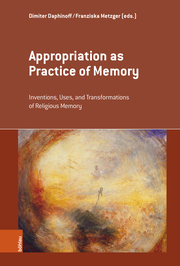Detailansicht
Appropriation as Practice of Memory
Inventions, Uses, and Transformations of Religious Memory, Erinnerungsräume 5
ISBN/EAN: 9783412531423
Umbreit-Nr.: 3413522
Sprache:
Englisch
Umfang:
Format in cm:
Einband:
gebundenes Buch
Erscheint am 18.11.2024
Auflage: 1/2024
- Zusatztext
- This volume explores how narratives and iconographic codes in literature, art, music, material culture and social, political, and economic discourses were appropriated and thereby - sometimes radically - transformed by religious agents, and how religious narrations, discourses and iconographic practices were reimagined and used (up to radical deconstruction) in non-religious contexts as well as in different or transformed religious contexts. Religious appropriation is thereby conceived as practice of memory, drawing on reused - and creating transformed - narrative and visual spaces of imagination. The dimension of memory will contribute to a more differentiated typology of practices of appropriation, their forms, functions and functionalisation. Agency and power relations will be important factors in the individual contributions of this trans-disciplinary volume that links approaches from memory studies, religious history, literary studies, and art history.
- Schlagzeile
- This trans-disciplinary volume explores how narratives and iconographic codes in literature, art, music, material culture and social, political, and economic discourses were appropriated and thereby - sometimes radically - transformed by religious agents, and how religious narrations, discourses and iconographic practices were reimagined in non-religious contexts as well as in different or transformed religious contexts. Religious appropriation is thereby conceived as practice of memory, drawing on reused narrative and visual spaces of imagination. The dimension of memory will contribute to a more differentiated typology of practices of appropriation, their forms, functions and functionalisation. Agency and power relations will be important factors in the individual contributions.
